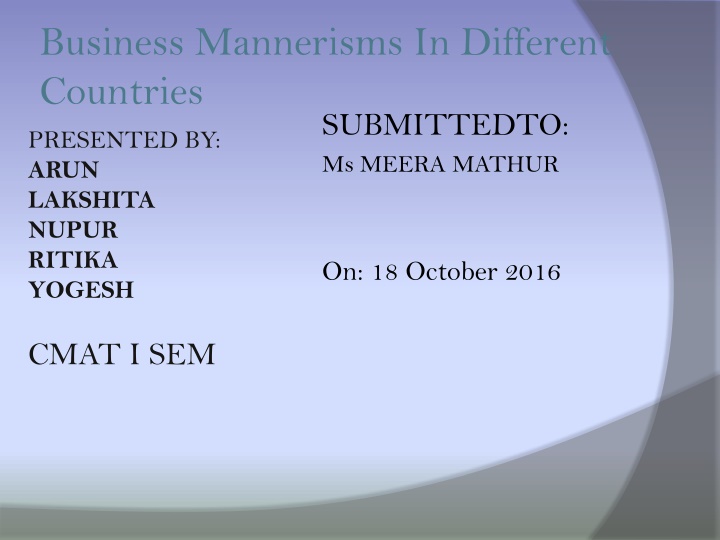
Business Mannerisms and Culture in Different Countries
Explore the appropriate business attire, behavior, and communication practices in the United States and Oman. From formal dressing to handshakes, this guide offers insights into conducting business effectively in diverse cultural settings.
Download Presentation

Please find below an Image/Link to download the presentation.
The content on the website is provided AS IS for your information and personal use only. It may not be sold, licensed, or shared on other websites without obtaining consent from the author. If you encounter any issues during the download, it is possible that the publisher has removed the file from their server.
You are allowed to download the files provided on this website for personal or commercial use, subject to the condition that they are used lawfully. All files are the property of their respective owners.
The content on the website is provided AS IS for your information and personal use only. It may not be sold, licensed, or shared on other websites without obtaining consent from the author.
E N D
Presentation Transcript
Business Mannerisms In Different Countries SUBMITTEDTO: Ms MEERA MATHUR ARUN LAKSHITA NUPUR RITIKA YOGESH PRESENTED BY: On: 18 October 2016 CMAT I SEM
Contents 1) USA 2) Oman 3) Brazil 4) China 5) Japan
APPEARANCE Business suit and tie are appropriate in all major cities. For an important formal meeting: white shirt For less formal meeting :a light blue shirt will still give a conservative appearance. Women wear a suit or dress with jacket in major cities. Wearing classic clothing and colors of navy , grey , ivory , and white will ensure you give a confident and conservative appearance .
BEHAVIOR Business conversation may take place during meals. Business meeting may be arranged as breakfast meetings, lunch meetings, or dinner meetings depending on time schedules and necessity. Gift giving is discouraged or limited by many US companies. A gracious written note is always appropriate and acceptable. If you are at someplace in a queue, go to the end wait for your turn. Many public places and private homes do not allow smoking.
COMMUNICATION Offer a firm handshake, upon greeting and leaving . Maintain good eye contact during hand shake. Good eye contact during business and social conversation shows interest , sincerity and confidence. Introduction include one s title if appropriate, or Mr., Ms or Mrs. And the full name. Business cards are generally exchanged during introductions. A smile is a sign of friendliness, and in rural areas you can greet with a hello rather than a handshake. Take permission to smoke before lighting a cigarette or cigar.
Doing business in Oman Given Oman's historical dependence on foreign labour, and the fact that nearly a quarter of its population is still made up of expatriates, it is highly likely that expats doing business in Oman will primarily deal with other expats, in a familiar and Expats should be aware of the customs when working in Oman Westernised business context. However, this guide will provide information on Arabic business culture to help prepare Western expats for that eventuality. Oman was ranked 66th out of 189 countries in the World Bank's Ease of Doing Business rankings for 2015; faring best in the paying taxes (where it is ranked 10th), and registering property (19th).
Fast facts Business language: The official language of Oman is Arabic, but English is widely spoken in business. Hours of business: Generally from 8am to 1pm and then 3.30pm to 6.30pm, from Sunday to Thursday. Friday and Saturday is the weekend. Dress: Smart and conservative, especially for women (elbows and knees covered, tops fastened at the neck). Gifts: If invited to an Omani colleague's home, take along a gift (a house plant or a trinket from an expat's home country will be appreciated). Don't give alcohol or anything made of pig skin. Gender equality: While Oman remains an Islamic nation, it is the most progressive of the Gulf countries when it comes to attitudes toward women in the workplace. Authorities are trying to limit the number of roles given to expat women and have banned them from taking up many posts, but those who do get a job in Oman should find themselves respected and valued.
Dos and don'ts of doing business in Oman Do look to establish personal and heartfelt relationships with Omani business associates. Do learn some basic Arabic, even just a few words and phrases, as it will go a long way towards dealing with business associates. Do remain respectful and observant of Islamic culture and traditions. Do make an effort to immerse oneself in the culture, learn some Arabic words and learn about the religion. Don't forget that in Oman, the line between professional and private life often blurs, expect family-related interruptions during business meetings. Don't embarrass, undermine or humiliate anyone during business meetings. While in the Western world this might further one's reputation, in the Arab world it will ruin any chances of forging good business relationships.
BUSINESS ETIQUETTES IN BRAZIL
Business Meeting Etiquette Business appointments are required Confirm the meeting in writing arrive on time for meetings Do not appear impatient if you are kept waiting Expect to be interrupted while you are speaking or making a presentation Avoid confrontations
Appearance in Brazil Three-piece suits carry an "executive" connotation, whereas two-piece suits are associated with office workers. Conservative attire for women in business is very important The colors of the Brazilian flag are yellow and green. Avoid wearing this combination in any fashion
Communications in Brazil Handshaking, often for a long time, is common women exchange kisses by placing their cheeks together and kissing the air First names used often, but titles important Music and long, animated conversation are favorite Brazilian habits Good conversation topics: soccer, family, and children
THE INITIAL APPROACH Business interactions between men and women are reserved. After an initial handshake, body contact is avoided BUSINESS RELATIONSHIP IN CHINA Chinese business relationship inevitably becomes a social relationship after a while.
SENIORITY IS VERY IMPORTANT TO THE CHINESE Giving face (giving due respect) is a very important concept in China. You must give the appropriate respect according to rank and seniority. Arriving late, causing embarrassment
LUNCH/DINNER IN CHINA There is no business talk in China without at least one trip to a restaurant. Sometimes, a trip is made to the restaurant even before any business discussion take place! Inevitably, the restaurant will always be a grand one. There are fixed seating positions for the host and the guest and then they are seated again according to seniority.
DRESS CODE Conservative suits for men with subtle colors are the norm. Women should avoid high heels and short sleeved blouses. Subtle, neutral colors should be worn by both men and women. Men and women can wear jeans. However, jeans are not acceptable for business meetings.
Dress Code and Appearance Very formal, frequently dress to impress despite conservative demeanor. Stick to dark colors preferably black or dark blue. Wear shoes that are easy to put on and remove as we will likely be doing so quite often. Women should avoid heels , trousers and much accessories. Though non verbal communication is a part of interaction, we should never point or use excessive hand gestures
Business Etiquette A conservative demeanor is advisable as it s not customary for Japanese businessmen to be brash or arrogant. Protocol is very important during any type of business affairs Upon the initial meeting with a Japanese host, traditions must be honored which includes bowing before handshake. Seating position very important as it s an indicator of status. Always wait to be seated.
Basic Things To Know As a foreigner you are expected to have your business card translated into Japanese. Must be of high quality and presented using both hands. When you greet your Japanese counterpart make sure you bow to them at the same height as them. When giving a gift make sure it s wrapped and try to avoid presenting flowers as gifts. Do not write in red ink You are expected to bring forth your best offer as Japanese rarely entertain counter offers.
Conclusions Usually the world over dark colors for formals are preferred. The meals form an important part of the meeting. Handshakes are usually preferred the world over.
References www.japanesebusinessresource.com www.intlcareers.com www.cyborlink.com www.wikipedia.org www.google.co.in





















